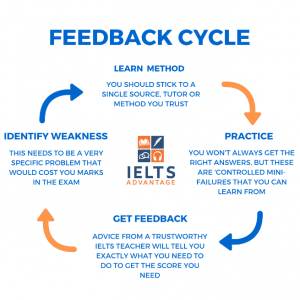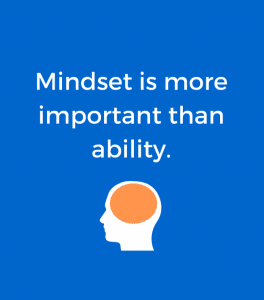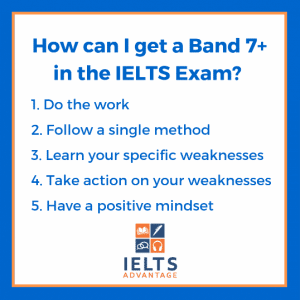How to get a Band 7+ in 5 steps:
- Do the work. Set aside time every day to practise.
- Follow a single method. If you follow the advice of multiple teachers, your thinking will be confused, and you will get a low score.
- Learn your weaknesses.
- Take action and turn your weaknesses into strengths. A qualified teacher can help you with this.
- Have a positive mindset. You are capable, and you can do it!
Do you need to score a high band in the IELTS exam but don’t know how to achieve it?
This post will highlight a simple five-step strategy you must follow if you would like to get a Band 7 or above in the IELTS exam.
1. Do the work
This one is obvious. You can’t get a good score on the exam if you don’t work for it, right?
We thought so too. However, we recently launched a Facebook challenge which gave IELTS pupils one task per day that would help identify and improve their weaknesses. Out of all the people that joined this mini-course, less than 5% actually completed all of the tasks we set for them. When we asked people why this was, the most popular response was ‘I didn’t have enough time’.
This is something that we hear every day, and our response is always the same: if it is important to you, you will make time.
Everyone gets 24 hours a day. Likewise, we all have obligations, goals and hobbies that we like to prioritise. When most people become busy, they tend to fall into a routine which makes them think that they are too busy to do anything else. These people are forgetting that you can be busy and still find time to prepare for the IELTS exam.
You will only ever have time to study if you actively go out and find it.
To do this, I would suggest analysing your daily timetable with scrutiny. You need to be firm, realistic and ask yourself difficult questions, such as Where can I spare the free time I currently have? Can I manage waking up earlier so I can study in the morning? Could I spend less time on Facebook and more time studying?
I think most people reading this would be surprised at the progress they could make in their IELTS skills by investing just 45 minutes a day every day for a month. A small amount of time goes a long way if it is invested consistently.
2. Follow a single method
When studying for the IELTS exam, it is important that you are not fooled into thinking that following the advice of lots of teachers increases your chance of success.
Looking at several different methods or teachers is one of the worst things you can do. I’m not telling you that you need to use my lessons to succeed – I know that I can’t help everyone – but you do need to find a single teacher you can trust and follow their feedback and advice.
Following too many teachers, methods or sources can harm you in three ways:
- Waste your time.
You should spend your precious time studying and preparing for the IELTS exam. When you’re given conflicting advice from several tutors, you are unsure of which method is correct. You do not want to waste time researching (or asking me!) which method is trustworthy.
- Cause unnecessary stress for yourself.
It is natural to become frustrated when you know which skills you want to improve but you don’t know which method is reliable or which advice will get you the score you need. Therefore, it’s important to remember that this stress does not mean that the test is impossible or too difficult; it is completely avoidable if you find a trustworthy source or IELTS expert.
- Lower your score.
No teacher will ever have the same two methods, and trying to decide which method will get you a Band 7 will only lead to confusion.
Your writing is a reflection of your thinking. If your thinking is confused, your writing will be confused.
3. Learn your specific weaknesses
When I say ‘specific weaknesses’, I don’t mean umbrella terms like ‘writing’ or ‘reading’.
Your ability to get a Band 7 depends on very specific reasons related to grammar, vocabulary, coherence and cohesion or other exact areas that need improvement.
Most experienced IELTS tutors can look at your essay and highlight within minutes the elements that are losing you marks, the exact weaknesses that will prevent you from getting a Band 7 or above. As this is not a possibility for everyone, it is up to you to find out what your weaknesses are.
If you don’t know what you’re doing wrong, you won’t know how to get better. This will stop you from passing and can cost you hope, time and money.
4. Take action on your weaknesses

Practice wisely. It is vital that you practice using reliable practice tests; there is no point using fake practice tests online because they simply won’t prepare you for the real IELTS exam.
Seeking advice from a trustworthy IELTS expert or tutor will provide you with a focused approach to the exam. This will let you know exactly what you need to do to get the band you need.
5. Have a positive mindset
The importance of positivity can often be underestimated by IELTS pupils. One of our key principles at IELTS Advantage is that mindset is more important than ability. You need to have a positive mindset if you want to score well in the IELTS test. If you tell yourself that you are never going to pass, you probably never will.
Try to remind yourself every so often that it is okay to be weak in a particular area, whether you struggle to understand written English or spoken English or with a specific section of the IELTS exam.
It is a natural part of learning something new to be challenged, so try to focus on your long-term goal: to pass the IELTS exam and change your life for the better.
I hope this blog post has helped you gain a clearer understanding of the workload required to get a Band 7 or above. If you have any questions, concerns or would like some personalised advice, please feel free to email me at chris@ieltsadvantage.com.
If you are willing to invest in your future and would like your work corrected by an IELTS professional, you should take a look at our Writing Correction Service and Speaking Correction Service.


